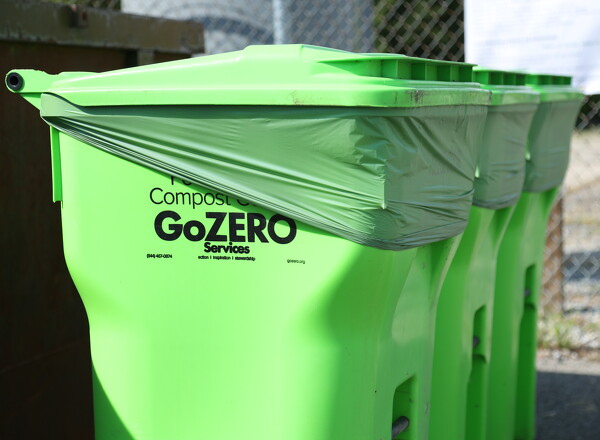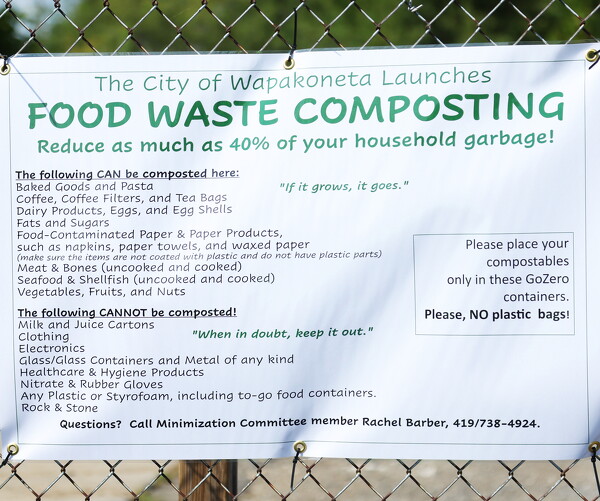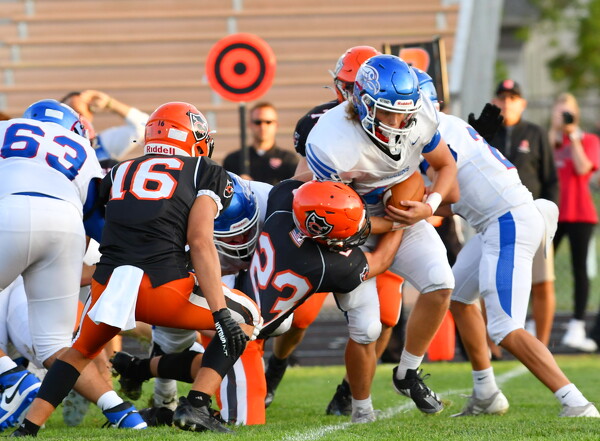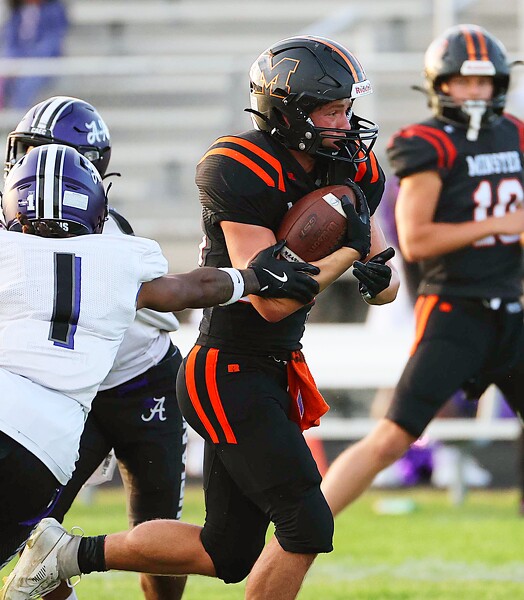
Residents of Wapakoneta may use these compost bins at the Wapakoneta Public Works building during the 6-month trial period of the city's food waste composting program.
WAPAKONETA - In an effort to save its residents money and cut down on landfill waste, the City of Wapakoneta is set to launch its first food waste composting program in September with a six-month trial run.
The city will launch a free 24/7 drop-off site at the Wapakoneta Public Works building at 110 E. Harrison St. next week for a variety of different types of food waste. Residents are directed to look for the three neon-green GoZero Services compost bins and to dump their compost into only those containers.
The trial is completely free to residents and is funded by the city at a cost of $135 a week. Following the six months, if the city continues the program full time, it will cost Wapakoneta around $7,000 a year.
Composting, when used correctly, conserves water, promotes healthier plant growth, reduces waste, improves soil health, combats climate change and assists in wetland reclamation, per the U.S. Composting Council.
According to the EPA, more than half of greenhouse gas emissions from landfills come from wasted food that could have been otherwise composted. Implementing composting into the home can cut as much as 40% of household garbage - also saving residents money on garbage bags.
Bringing composting to the area was one of the city's waste minimization committee's biggest goals, committee advisor Heather Walbright said.
With that mission in mind, committee member Rachel Barber reached out to GoZero Services of Zanesville about their services, which ended up being a perfect fit for Wapakoneta.
"They happened to be actually one of the largest food waste commercial haulers in the state," Walbright said. "They came and we had a meeting with them. It was a good fit as far as (Wapakoneta) being a smaller community, (and) we're still on route for them being right off I-75 and U.S. Route 33 because they service locations all the way from Cincinnati, Toledo, and Columbus."
Walbright said GoZero will pick up the composted materials from the bins weekly. From there, the material will go to one of the company's industrial processing facilities.
"It's an industrial composting facility, so we're able to take a lot more material than a traditional, backyard home composting program," she said.

A simple rule to go by when considering what waste items to place in the bins is "if it grows, it goes."
Waste accepted in the compost bins includes baked goods and pasta; coffee, coffee filters, tea bags; dairy products, eggs, egg shells; fats and sugars; food-contaminated paper and paper products like napkins, paper towels and wax paper; meat and bones (uncooked and cooked); seafood and shellfish (uncooked and cooked); and vegetables, fruits and nuts.
The following cannot be composted and should not be placed in the green bins: milk and juice cartons; clothing; electronics; glass/glass containers and metal of any kind; health care and hygiene products; nitrate and rubber gloves; any plastic or styrofoam, including to-go food containers; and rocks or stones.
"We can take like literally any food - processed food, meat, it can be raw, any kind of food waste, whether it's prepped, whether it's already cooked, whether it's disgusting and it's been in the fridge for a while," Walbright said. "It doesn't matter. They will take it because it's going to go to this type of commercial facility, where they can handle that type of material."
For best practice, the committee encourages residents to follow two simple rules when composting:
"If it grows, it goes," and "When in doubt, keep it out."
That means any natural food waste that is grown or that comes from an animal should be safe to compost - and if there is any waste that residents are unsure of, they should just leave it out.
Once the waste arrives to one of GoZero's facilities, the company composts the food waste into a dark, nutrient-rich, soil-like material that they sell to gardeners and farmers all over the area. Compost can be used as a soil amendment or mulch.
Committee advisor Nathan Burnell encouraged composting newcomers to first learn what waste is and is not compostable.
"The big three (that people can compost) are coffee grounds, eggshells, banana peels," he said. "Those are the big three to kind of think about. And then the fourth one I would throw in there is paper towels. A lot of times we don't realize that paper towels are also compostable but they help with absorbing some of that liquid that goes into your compost as well."
Next, Burnell advised residents to set up some sort of composting routine for themselves.
"So having a container of some kind, either an old Tupperware container, a 5-gallon bucket outside, whatever kind of suits your needs to collect the food waste in," he said. "Some people might have something in their house that they fill up and then that gets dumped into a bigger, maybe 5-gallon bucket outside. And then that goes to the green roll-cart system when that gets full."
For people interested in composting but concerned about the potential smell of waste inside their home, Burnell offered a tip: Keep your inside receptacle in the fridge or freezer.
"The cold helps keep it from decomposing as quickly," he said. "Or keep a lid on (the container). That always helps with the smell. You'd be surprised how quickly you fill it up and how much it doesn't smell."
Though the program is set to officially start in September, the green bins are outside of the public works building and residents can be begin dumping compost now. The bins are available 24/7 for residents to drop off waste. For more information, call Barber at 419-738-4924.

